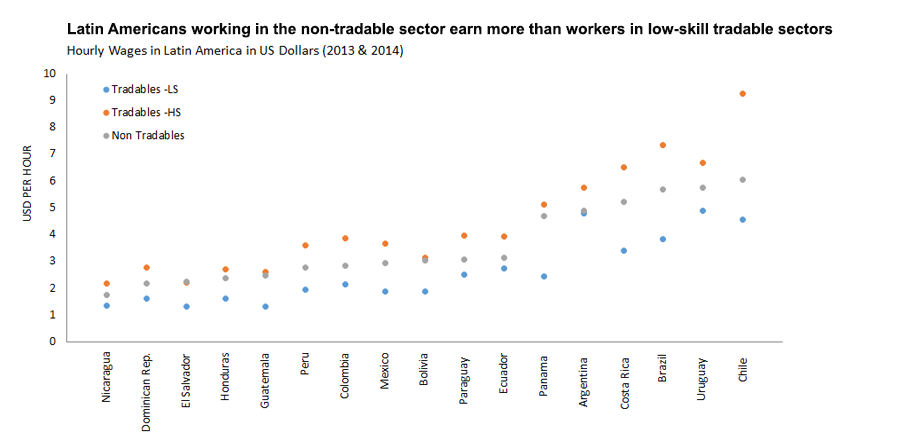Recent data on hourly wages in Latin America and the Caribbean (LAC) reveal that Latin Americans working in the non-tradable sector (as in construction, transportation, hotels, or education) earn much more than workers in low-skill tradable sectors such as agriculture or low-tech manufacturing, and closer to high-skill workers in the tradable sector such as high-tech manufacturing or finance. Despite slight variations across countries, in 11 out of 17 countries studied, the difference between wages in low-skill tradable and non-tradable sectors has grown over the last ten years.[1] In most of these countries, hourly wages display a distinct trend: positive growth for high-skill tradable and non-tradable wages, and stagnating, or even declining for low-skill tradable wages.

Source: World Bank's LAC Equity Lab
Is this something to worry about? Luckily, we happened to eavesdrop on a conversation between the eternally optimistic Professor Pangloss and the doomsday-predicting Cassandra:
- Pangloss: Isn’t it uplifting to see that a large share of the employed workforce in LAC has experienced income improvements in the last decade, Cassandra? This means more people are getting out of poverty and have good jobs!
- Cassandra: Well, not so fast, professor. Non-tradable sectors are full of people working on jobs that add little value, like self-employed street vendors. Do you really believe their future is bright, even if they don’t become more productive?
- Pangloss: I do! As high-skilled tradable sectors continue to grow, they are only going to fuel demand for services, increasing the labor incomes of non-tradable sector workers.
- Cassandra: Come on, professor. You know this will only increase wage inequality between workers in low-skill and high-skilled jobs. The poorest, farm workers and low-wage factory workers, will still be poorer.
- Pangloss: I think your logic is wrong. The way I see it, agricultural workers will continue to diversify away from farm work into better paying service jobs, and agriculture will have to increase wages to survive. People will also increase their demand for farm products, especially those with higher value added, making farm work more profitable.
- Cassandra: But who will invest in these sectors if their labor costs increase? It’s a race to the bottom nowadays, with firms moving to ever cheaper labor countries!
- Pangloss: Oh, Cassandra, I am upbeat about the wage situation in the region and you are not going to convince me otherwise. Let’s agree to disagree. On that note, ciao.
- Cassandra: Good day, professor.
Readers, what do you think? Do you think if Professor Pangloss is right or is it Cassandra? Leave us a comment.
Note: This blog is part of the 'lacfeaturegraph' series from the LAC Equity Lab team. To look at past posts, please visit here.



Join the Conversation